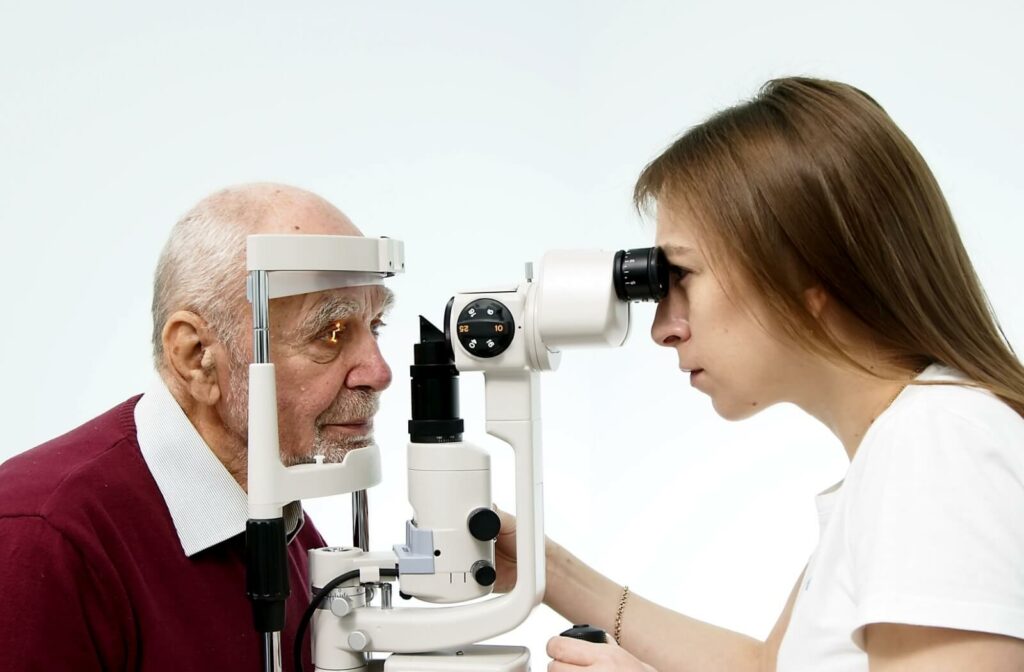Managing diabetes involves juggling many health priorities, but protecting your vision should remain at the top of your list. A diabetic eye exam is an evaluation designed to assess your eye health, detect potential complications early, and protect your vision.
Diabetes affects many Americans, and its impact on eye health often goes symptomless until after damage has already occurred. Regularly scheduled diabetic eye exams are one of the most effective ways to stay ahead of vision-threatening conditions.
How Diabetes Affects Your Eye Health
Diabetes is a chronic condition that disrupts your body’s ability to regulate blood sugar levels. When blood sugar remains elevated over time, this can damage delicate blood vessels throughout your body—including the tiny vessels in your eyes.
This damage can lead to several serious eye conditions:
Diabetic Retinopathy
Diabetic retinopathy occurs when high blood sugar damages the small blood vessels in your retina. These vessels may leak, swell, or become blocked, potentially leading to vision loss. Advanced stages can trigger the growth of new, fragile blood vessels that cause additional complications.
Diabetic Macular Edema
Diabetic macular edema develops when damaged retinal blood vessels leak fluid, causing the macula to swell. Since the macula controls your sharp central vision, this swelling can significantly impact your ability to read, drive, or see fine details.
Glaucoma
Glaucoma affects people with diabetes at twice the rate of those without the condition. This disease usually occurs when increased pressure inside the eye damages the optic nerve, gradually stealing your peripheral vision.
Retinal Detachment
Retinal detachment can happen when scar tissue from diabetic retinopathy pulls the retina away from the back of the eye. This medical emergency requires immediate treatment to prevent permanent vision loss.
Recognizing the Warning Signs

While many diabetic eye conditions develop without obvious symptoms, some warning signs include:
- Blurry or fluctuating vision
- Sudden flashes of light or new floaters
- Gradual or sudden vision loss
- Eye pain or pressure
- Dark spots in your visual field
Even without symptoms, staying proactive about your eye health through regular diabetic eye exams remains crucial for early detection and treatment.
Understanding the Diabetic Eye Exam
A diabetic eye exam goes beyond a standard vision check and focuses specifically on detecting diabetes-related changes in your retina, optic nerve, and blood vessels.
During the exam, your optometrist will likely use dilating drops to widen your pupils, allowing for a detailed view of your eye’s internal structures. This allows for early detection of potential problems before they progress to more serious issues.
Eye care professionals recommend annual diabetic eye exams for anyone with diabetes. Consistent monitoring allows your optometrist to track changes over time and intervene when necessary to protect your vision.
What to Expect During Your Visit
Understanding what happens during a diabetic eye exam can help ease any anxiety and ensure you’re prepared for your appointment.
Initial Assessment
Your exam begins with measurements of your eye pressure, and by using a tonometry instrument to screen for glaucoma. We may also perform a visual field test to evaluate your peripheral vision and detect any areas of vision loss.
Pupil Dilation
Dilating drops temporarily widen your pupils, allowing us to examine the back of your eyes more thoroughly. While the drops may cause temporary light sensitivity and blurred vision, the process is gentle and painless. We recommend bringing sunglasses and arranging transportation, as the effects can last several hours.
Advanced Imaging Technology
Modern diabetic eye exams often include imaging techniques that provide detailed pictures of your retina and optic nerve. These high-resolution images help us identify even subtle changes that might indicate developing problems.
Comprehensive Examination
Using instruments like a slit lamp and ophthalmoscope, we can conduct a thorough evaluation of your eye’s internal health. We’ll carefully examine your retina, blood vessels, and optic nerve for signs of diabetic retinopathy, macular edema, glaucoma, or other complications.
Results & Follow-Up
After completing the examination, we’ll review our findings with you and answer any questions. If we detect any issues, we’ll discuss treatment options, lifestyle recommendations, or the need for more frequent monitoring. Many patients find great peace of mind in understanding their current eye health status and having a clear plan moving forward.
Protecting Your Vision Through Proactive Care
For people living with diabetes, annual eye exams represent a vital investment in long-term vision health. Even when you’re successfully managing your blood sugar levels, diabetic eye conditions can still develop without warning symptoms.
Our compassionate team at Verona Vision Care understands the challenges of managing diabetes, which is why we prioritize your comfort throughout the examination process. Our optometrists provide thorough, personalized care that fits seamlessly into your healthcare routine.
Don’t wait for symptoms to appear. Book your diabetic eye exam today and take an important step toward protecting your vision for the future.




